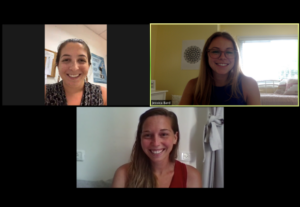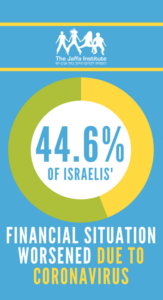Making a Difference From Across the Pond

Press Release
July 2020
MAKING A DIFFERENCE FROM ACROSS THE POND
A few months ago, my mouth was practically watering thinking about the endless falafel and hummus I would be eating all summer long, as I planned my two-month trip to Tel Aviv. I was eager to return to the place that has grown to be so special to me since I went on Birthright last summer, but most importantly, I couldn’t wait to start my internship with the Jaffa Institute. Needless to say, when the COVID-19 pandemic made international travel impossible, I was pretty devastated. Although I was definitely bummed and skeptical at the thought of a remote internship, I gave it a shot – and I am so glad I did!

Shalom, my name is Jessica Bard, and I am a senior at Penn State University, studying Education and Public Policy. Throughout my coursework, I have continuously learned about the detrimental effects that living in poverty has on a child’s educational achievement and career outcomes. Time after time, the research proves that the best way to decrease inequality isn’t just to invest within schools, but to invest in children’s experiences outside of school. As a Grants and Development Intern, I had the opportunity to see how the Jaffa Institute does exactly that.
With more than 40 programs addressing the unique needs of severely disadvantaged children and families living in the greater Tel Aviv-Jaffa area, the Jaffa Institute has created a holistic framework to help put an end to the cycle of intergenerational poverty.
They recognize that in order to really improve the chances of these disadvantaged children, there isn’t just one simple solution. Children and their families need a combination of nutritional, educational, therapeutic, and/or social support in order to reach their potential.
This internship has also granted me the unique experience of observing how the Jaffa Institute continues to adjust to the challenges caused by the COVID-19 pandemic. While these past few months have been a vulnerable and difficult time for everyone, disadvantaged populations have undoubtedly been hit the hardest. As the founder of the Jaffa Institute, David Portowicz, put it in the Jaffa Institute’s very first webinar this summer, “Not for one minute did we forget our responsibility to help the children and families [during the Coronavirus lockdown]”.
So, where do we go from here?
The Jaffa Institute’s quick and successful response to the COVID-19 pandemic was crucial to ensuring these vulnerable populations were supported during this time. Here are just a few ways that the Jaffa Institute restrategized their programming to fit the growing needs of the community:
- In 2019, a shocking 1.6 million Israelis suffered from food insecurity. Unfortunately, the Coronavirus pandemic exacerbated this with 44.6% of Israelis reporting that their financial situation worsened in recent months. When families already struggle to
 make ends meet, any setback (such as reduced hours or unemployment) could put their safety and wellbeing at risk, which is why the Jaffa Institute’s Food Distribution Center expanded to reach 500 additional households during the lockdown.
make ends meet, any setback (such as reduced hours or unemployment) could put their safety and wellbeing at risk, which is why the Jaffa Institute’s Food Distribution Center expanded to reach 500 additional households during the lockdown. - Additionally, 25% of Israeli parents reported that the emotional state of their children worsened as a result of the pandemic. To better serve the community’s needs, we are emphasizing the importance of therapy for the children in our programs. This therapeutic support ranges from horseback riding at the Jaffa Daled Youth Club for At-Risk Teenage Boys to culinary sessions at the Stepping Stone Program for At-Risk Teenage Girls.
- Despite comprising less than 50% of the workforce, women filed 56% of the unemployment claims made during the pandemic. This disproportionately high number of women leaving the workforce exemplifies the need for the Welfare to Wellbeing program’s upcoming September cycle, helping disenfranchised women gain the skills and confidence to transcend their adversity and enter the workforce. Welfare to Wellbeing helps long-term unemployed women find and maintain gainful employment through vocational training, therapy, and empowerment workshops.
- Struggling with increased feelings of loneliness during the lockdown, participants in our Accompanying the Elderly program received a higher frequency of phone calls from volunteers and social workers. This video of a Holocaust survivor explaining how much it means to have someone caring about her wellbeing shows just how strong the connections between volunteers and program participants become.
 Although this internship has been unconventional, I still feel immensely connected to the work I am doing with the Jaffa Institute. Zoom meetings and emails turned my bedroom into an “office” and allowed me to connect with the incredibly inspiring and dedicated staff members. The passion and care that this organization has for the communities and individuals it serves is clear to me, even from across the world, and that had the biggest impact on me throughout this entire experience.
Although this internship has been unconventional, I still feel immensely connected to the work I am doing with the Jaffa Institute. Zoom meetings and emails turned my bedroom into an “office” and allowed me to connect with the incredibly inspiring and dedicated staff members. The passion and care that this organization has for the communities and individuals it serves is clear to me, even from across the world, and that had the biggest impact on me throughout this entire experience.
I can hardly wait for my next visit to Israel, so I can meet everyone and see the incredible programs that I have spent my summer learning about in-person!
If you are interested in learning more about the Jaffa Institute, you can find us on Facebook, Instagram, or our website, www.jaffainstitute.org. We hope you connect with our mission as much as we do, and if you are interested in interning or volunteering, please contact Yoel (yoel@jaffainst.co.il).
